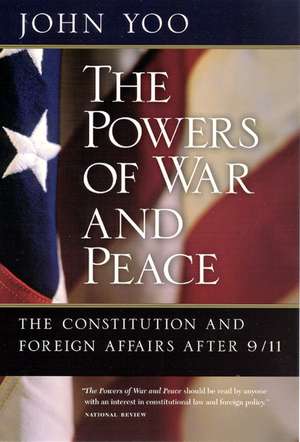The Powers of War and Peace: The Constitution and Foreign Affairs after 9/11
Autor John Yooen Limba Engleză Paperback – 9 oct 2006
Since the September 11 attacks on the United States, the Bush administration has come under fire for its methods of combating terrorism. Waging war against al Qaeda has proven to be a legal quagmire, with critics claiming that the administration's response in Afghanistan and Iraq is unconstitutional. The war on terror—and, in a larger sense, the administration's decision to withdraw from the ABM Treaty and the Kyoto accords—has many wondering whether the constitutional framework for making foreign affairs decisions has been discarded by the present administration.
John Yoo, formerly a lawyer in the Department of Justice, here makes the case for a completely new approach to understanding what the Constitution says about foreign affairs, particularly the powers of war and peace. Looking to American history, Yoo points out that from Truman and Korea to Clinton's intervention in Kosovo, American presidents have had to act decisively on the world stage without a declaration of war. They are able to do so, Yoo argues, because the Constitution grants the president, Congress, and the courts very different powers, requiring them to negotiate the country's foreign policy. Yoo roots his controversial analysis in a brilliant reconstruction of the original understanding of the foreign affairs power and supplements it with arguments based on constitutional text, structure, and history.
Accessibly blending historical arguments with current policy debates, The Powers of War and Peace will no doubt be hotly debated. And while the questions it addresses are as old and fundamental as the Constitution itself, America's response to the September 11 attacks has renewed them with even greater force and urgency.
John Yoo, formerly a lawyer in the Department of Justice, here makes the case for a completely new approach to understanding what the Constitution says about foreign affairs, particularly the powers of war and peace. Looking to American history, Yoo points out that from Truman and Korea to Clinton's intervention in Kosovo, American presidents have had to act decisively on the world stage without a declaration of war. They are able to do so, Yoo argues, because the Constitution grants the president, Congress, and the courts very different powers, requiring them to negotiate the country's foreign policy. Yoo roots his controversial analysis in a brilliant reconstruction of the original understanding of the foreign affairs power and supplements it with arguments based on constitutional text, structure, and history.
Accessibly blending historical arguments with current policy debates, The Powers of War and Peace will no doubt be hotly debated. And while the questions it addresses are as old and fundamental as the Constitution itself, America's response to the September 11 attacks has renewed them with even greater force and urgency.
“Can the president of the United States do whatever he likes in wartime without oversight from Congress or the courts? This year, the issue came to a head as the Bush administration struggled to maintain its aggressive approach to the detention and interrogation of suspected enemy combatants in the war on terrorism. But this was also the year that the administration’s claims about presidential supremacy received their most sustained intellectual defense [in] The Powers of War and Peace.”—Jeffrey Rosen, New York Times
“Yoo’s theory promotes frank discussion of the national interest and makes it harder for politicians to parade policy conflicts as constitutional crises. Most important, Yoo’s approach offers a way to renew our political system’s democratic vigor.”—David B. Rivkin Jr. and Carlos Ramos-Mrosovsky, National Review
“Yoo’s theory promotes frank discussion of the national interest and makes it harder for politicians to parade policy conflicts as constitutional crises. Most important, Yoo’s approach offers a way to renew our political system’s democratic vigor.”—David B. Rivkin Jr. and Carlos Ramos-Mrosovsky, National Review
Preț: 193.17 lei
Nou
Puncte Express: 290
Preț estimativ în valută:
36.97€ • 38.19$ • 30.77£
36.97€ • 38.19$ • 30.77£
Carte tipărită la comandă
Livrare economică 25 martie-08 aprilie
Preluare comenzi: 021 569.72.76
Specificații
ISBN-13: 9780226960326
ISBN-10: 0226960323
Pagini: 378
Dimensiuni: 152 x 229 x 25 mm
Greutate: 0.55 kg
Editura: University of Chicago Press
Colecția University of Chicago Press
ISBN-10: 0226960323
Pagini: 378
Dimensiuni: 152 x 229 x 25 mm
Greutate: 0.55 kg
Editura: University of Chicago Press
Colecția University of Chicago Press
Notă biografică
John Yoo is professor of law at Boalt Hall School of Law at the University of California, Berkeley, and a visiting scholar at the American Enterprise Institute. He served as general counsel of the Senate Judiciary Committee; as a law clerk to Justice Clarence Thomas and Judge Laurence H. Silberman; and, from 2001 to 2003, as a deputy assistant attorney general in the Office of Legal Counsel of the U.S. Department of Justice.
Cuprins
Preface
1. Introduction
2. The Eighteenth-Century Anglo-American Constitution and Foreign Affairs
3. Foreign Affairs and the Prelude to the Constitution
4. Writing and Ratifying a Foreign Affairs Constitution
5. War Powers for a New World
6. International Politics as Law? Interpreting and Ending Treaties
7. Treaties and the Legislative Power
8. Laws as Treaties? Statutes as International Agreements
9. The Constitution and the Multilateral Future
Notes
Index
1. Introduction
2. The Eighteenth-Century Anglo-American Constitution and Foreign Affairs
3. Foreign Affairs and the Prelude to the Constitution
4. Writing and Ratifying a Foreign Affairs Constitution
5. War Powers for a New World
6. International Politics as Law? Interpreting and Ending Treaties
7. Treaties and the Legislative Power
8. Laws as Treaties? Statutes as International Agreements
9. The Constitution and the Multilateral Future
Notes
Index
